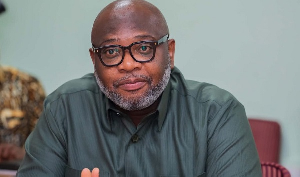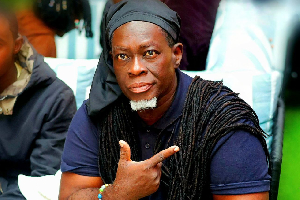General News of Saturday, 29 May 2021
Source: GNA
Peace Expert calls for prisons reforms
Dr Prize McApreko, a UNESCO Peace Programme Ambassador has advocated state engagement with the appropriate authorities, to consider, in the healthy context, possible prison reforms that respect internationally accepted human rights provisions.
The recommendation is to ensure inmates were neither abused nor deprived of fundamental human rights.
He stated that such reforms should take into consideration how inmates contributed meaningfully to a pool of human resource that was capable of engineering responsible Internally Generated Funds to complement government funding.
Dr. McApreko who said this in an interview with the Ghana News Agency after the Sekondi Prisons incident, said there was also the need to maximize responsible non-custodial sentences in order not to congest the prisons in the first place.
He mentioned that if the prisons failed to reform inmates before they rejoined the larger society, the peace and security would have been sacrificed for the regained freedom of prisoners.
"Rather than congesting our prisons with “mild offenders”, is it feasible to alter prevailing legislation so that such “mild offenders” are made to undergo non-custodial sentences so they could even help in the current decongestion and cleaning up exercises in our major cities...this could ensure that organizations and other state institutions benefit from services which inmates would offer, while the latter benefits financially, Is it time we discuss as a nation,"
Some statistics available in the public domain estimated that the overcrowding and congestion rate in the prisons was about 52 percent, translating to a whopping 15,000 prisoners grappling with 9,945 available spaces.
For instance, the Sekondi Central Prison which was originally built to contain 400 inmates is currently housing over 600 inmates.
He also stressed the need for families, religious and other organizations to support inmates with food items to complement government efforts.
The Peace Ambassador said it was also important to underscore the fact that, the human dignity of inmates remained an inviolable human right to which they are legitimately entitled, and the Prisons Service should constantly endeavour to uphold such norms.
Dr. McApreko said, "Having been deeply associated with defending responsible freedoms, civil liberties and fundamental human rights, I deeply identify with Immanuel Kant’s moral philosophical proposition that the human rights abuse of anyone anywhere reflects the human rights violation of everyone everywhere. It is in this regard that any form of indignity of our prisoners should be of concern to us all.
"History teaches that several people have found themselves in prison for crimes they did not commit, and that depending on social circumstances, anyone could find him or herself in jail at any point in time either rightly or wrongly for several reasons".
It is therefore important that we all contribute to ensuring that whereas imprisonment curtails a substantial part of a victim’s civil liberties, one’s basic fundamental rights of personhood should not be mortgaged for being an inmate.
He added that since prison life could be anyone’s experience at any time, "humanity ought to agree that Prison lives too matter."
Dr McApreko urged stakeholders to see prison inmates as people with the same potentials, capacities and human rights rather than perceive them as “condemned to their own fate” to develop a better mindset for handling them better.












